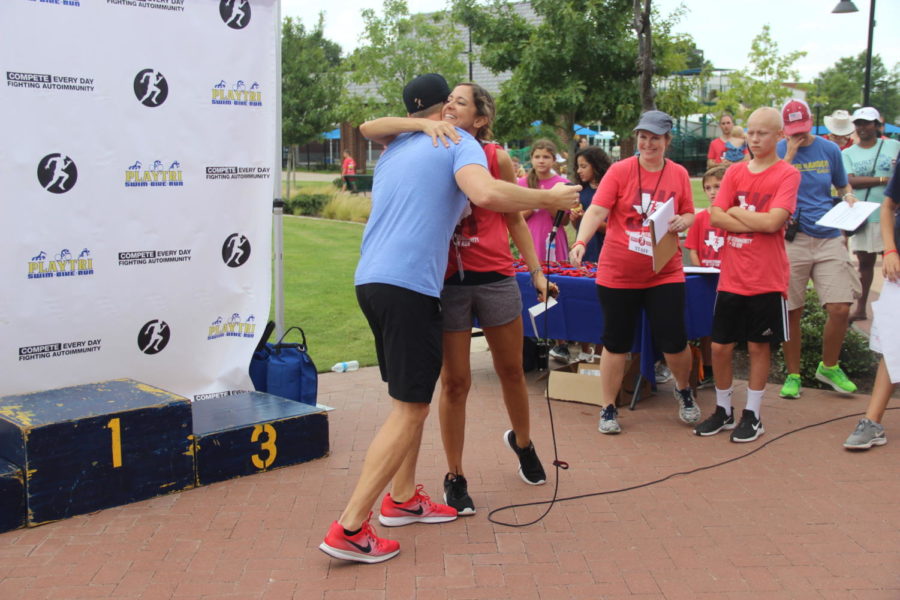Running for a cause: Local park holds fifth Fighting Autoimmune Disease 5K run (with video)
September 6, 2019
On a cool, breezy Saturday morning, Andy Brown Park East hosted the fifth annual Fighting Autoimmune Disease 5K run, a charity run aimed at raising awareness and funds for autoimmune disease research and organizations.
At 7:40 a.m., the park entrance was already bustling with activity as the excited aura of runners filled the air. The event kicked off with its Fun Run at 8 a.m., a 1-mile-long run only around the inner path of Andy Brown Park East geared towards families with dogs, strollers and children. The 5K race followed at 8:30 a.m. It started with a bang as almost 500 runners began their run, cheered on by a crowd of supporters. The run, guided by volunteers on bikes in the front and back, traversed Andy Brown Park East’s outskirts.
The winners were 16-year-old Ryan Goodrich in the male category with a time of 20 minutes, 9 seconds and 33-year-old Jodi Thompson in the female category with a time of 20:20. More information on the race rankings can be found on Athlinks.
Coppell residents Erika Slater and Lindy Kinnan founded the Fighting Autoimmune Disease 5K charity run as two mothers wanting to raise more awareness for a disease many look over. Both the women’s sons were diagnosed with an autoimmune disease at a young age – Slater’s 11-year-old son, Hunter, has autoimmune encephalitis, vitiligo and celiac, while Kinnan’s 12-year-old son, Cole, has alopecia.
A triathlete herself, Slater was surprised to find no local runs aimed at supporting autoimmunity, so she teamed up with Kinnan, whose son was just diagnosed with alopecia at the time, and created the run as a way for people to come together and support the cause.
“[My son] was losing his hair and he wanted me to help him get better, but there wasn’t anything I could do. This [event] was a way I could fight back and feel some power over autoimmune disease by spreading awareness [and] letting our community know what alopecia is.” — Lindy Kannan
“My son doesn’t really know too much about [his autoimmune disease]; he knows he’s been to the hospital and he understands there is something different [about him],” Slater said. “But if we bring people together to tell everyone autoimmune disease is something that happens to more than just one person, it’s a little bit more.”
Coming in a wide range of forms, Autoimmune disease affects about 24 million people in the United States alone. The disease causes one’s immune system to mistakenly attack its own body cells, recognizing them as foreign. And though medical treatment cannot directly cure autoimmune diseases, it can still lessen their impact and reduce pain.
“There’s no cure or medicine that helps with alopecia, so as a parent I felt pretty helpless,” Kinnan said. ““But if we bring people together to tell everyone autoimmune disease is something that happens to more than just one person, it’s a little bit more.”
Since it began five years ago, the Fighting Autoimmune Disease 5K Run has raised $47,000 for research and charity organizations and continues to see great growth every year. The run broke its previous record last year by raising $16,500, and though this year’s final amount of donations hasn’t been calculated yet, it is expected to surpass last year’s amount.
All funds from donations raised in the run were pledged to two organizations – the CONQUER project and the Children Alopecia Project (CAP). The CONQUER Project (Collaboration on Neuroimmunology: Question, Understand, Educate, Restore) is an initiative by UT Southwestern to solve issues for autoimmune patients by conducting research, and CAP is the only 501(c) 3 non-profit devoted specifically to helping children living with alopecia by raising awareness and providing support for children and their families.
“It’s really inspiring and overwhelming on the actual day to see so many people come to something we started together,” Kinnan said. “It’s really cool when people tell us their stories, about people that have autoimmune disease in their family or themselves. I especially like those personal touches when you hear why the autoimmune disease is something they are connected with and why they come and support our race.”












Best Autoimmune Doctor • Sep 19, 2019 at 1:32 am
An autoimmune disease is a result of breakdown or malfunction of the immune system. There are more than one hundred immune system disorders. Modern medicine is unable to explain or specifically identify the causes of autoimmune diseases. Despite the advancement of modern science and technology, frustration and disappointment are part of modern medicine in the area of autoimmunity.